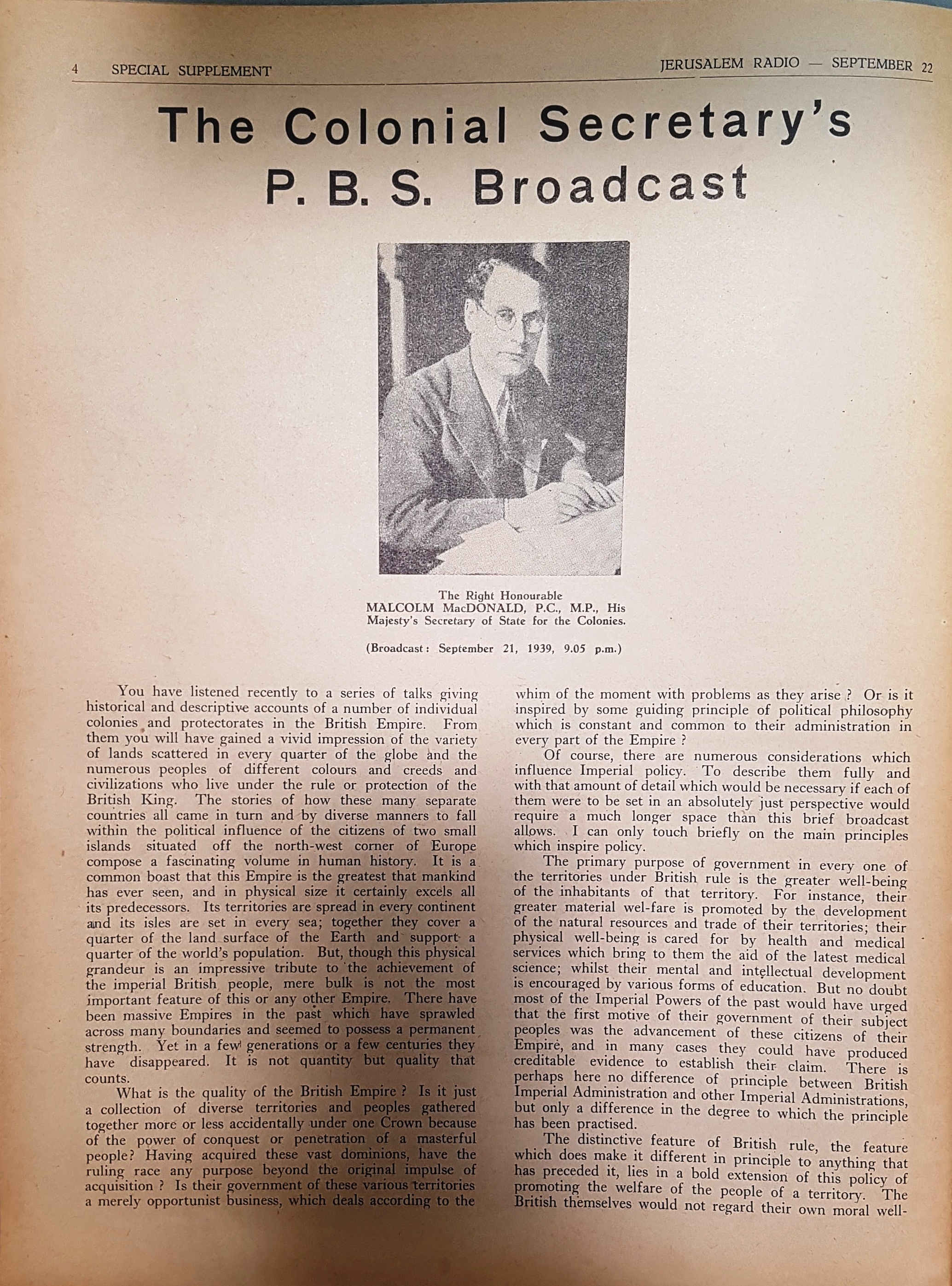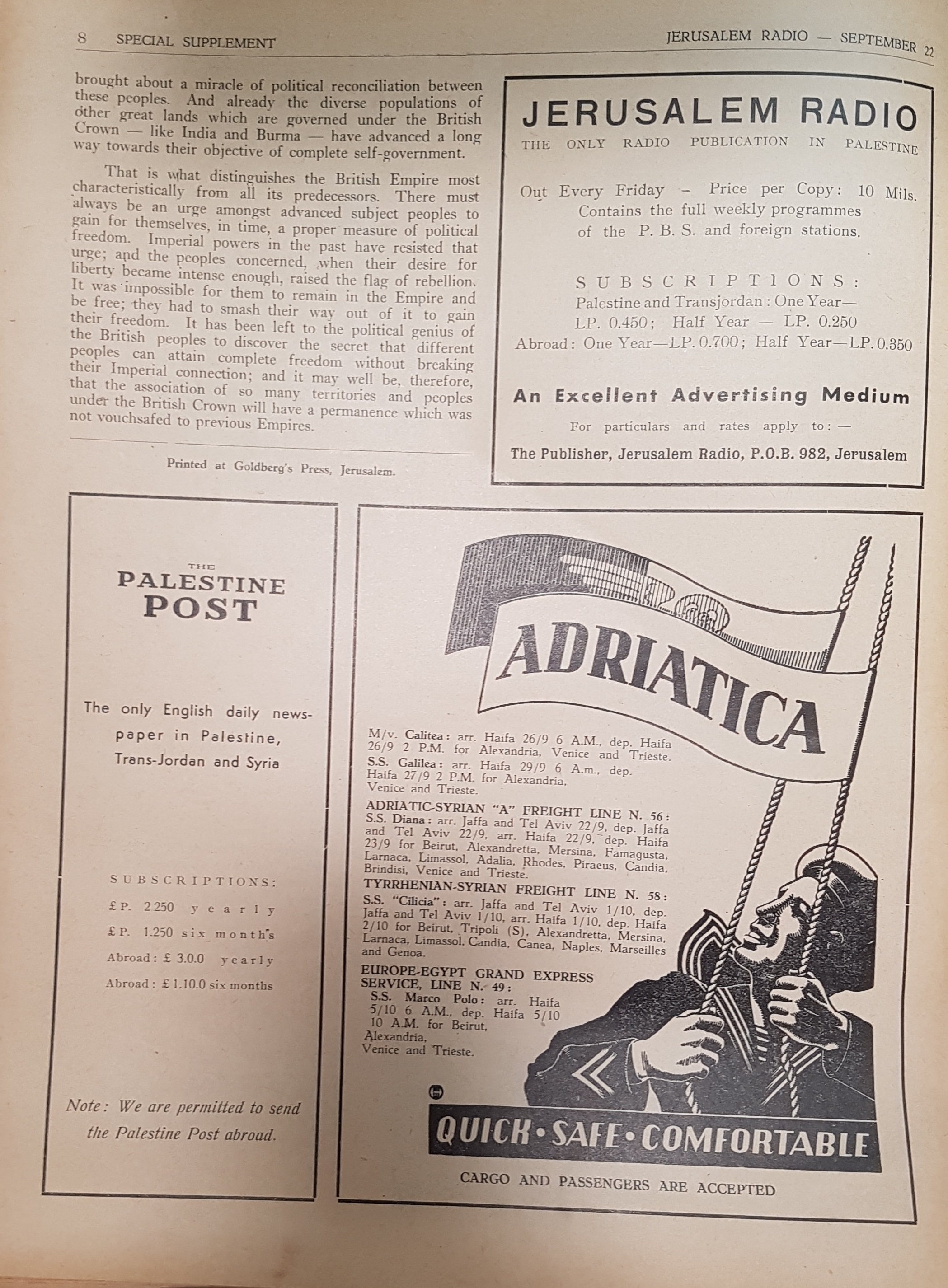Digitizing History: Palestine Broadcasting Service, 1936-1948
International and Current Affairs: The British Commonwealth of Nations

JERUSALEM RADIO - SEPTEMBER 22, 1939
The CoIoniaI Secretary's P.B.S. Broadcast
The Right Honourable MALCOLM MacDONALD, P.C., M.P., His Majesty's Secretary of State for the Colonies.
(Broadcast: September 21, 1939, 9.05 p.m.]
You have listened recently to a series of talks giving historical and descriptive accounts of a number of individual colonies and protectorates in the British Empire. From them you will have gained a vivid impression of the variety of lands scattered in every quarter of the globe and the numerous peoples of different colours and creeds and civilizations who live under the rule or protection of the British King. The stories of how these many separate countries all came in turn and by diverse manners to fall within the political influence of the citizens of two small islands situated off the north-west comer of Europe compose a fascinating volume in human history. It is a common boast that this Empire is the greatest that mankind has ever seen, and in physical size it certainly excels all its predecessors. Its territories are spread in every continent and its isles are set in every sea; together they cover quarter of the land surface of the Earth, and support a quarter of the world's populatio. But, though this physical grandeur is an impressive tribute the imperial British people, mere bulk is not the most important feature of this or any other Empire. There have been massive Empires in the past which have sprawled across many boundaries and seemed to possess a permanent strength. Yet in a few generations or a few centuries they have disappeared. It is not quantity but quality that counts.
What is the quality of the British Empire? Is it just a collection of diverse territories and peoples gathered together more or less accidentally under one Crown because of the power of conquest or penetration of a masterful people? Having acquired these vast dominions, have the ruling race and purpose beyond the original impulse of acquisition? Is their government of these various territories a merely opportunist business, which deals according to the whim of the moment with problems as they arise? Or is it inspired by some guiding principle of political philosopy which is constant and common to their administration in every part of the Empire?
Of course, there are numerous considerations which influence Imperial policy. To describe them fully and with that amount of detail which would be necessary if each of them were to be set in an absolutely Just perspective would require a much longer space than this brief broadcast allows. I can only touch briefly on the main principles which inspire policy.
The primary purpose of government in every one of the territories under British rule is the greater well-being of the inhabitants of that territory. For instance, their greater material wel-fare is promoted by the development of the natural resources and trade of their territories; their physical well-being is cared for by health and medical services which bring to them the aid of the latest medical science; whilst their mental and intellectual development is encouraged by various forms of education. But no doubt most of the Imperial Powers of the past would have urged that the first motive of their government of their subject peoples was the advancement of these citizens of their Empire, and in many cases they could have produced creditable evidence to establish their claim. There is perhaps here no difference of principle between British Imperial Administration and other Imperial Administrations but only a difference in the degree to which the principle has been practised.
The distinctive feature of British rule, the feature which does make it different in principle to anything that has bpreceded it, lies in bold extension of this policy of promoting he welfare of the people of a territory. The British themselves would not regard their own moral well-

Page 5
being as completely secured unless they were politically free to govern themselves. Earlier generations of Ieaders in the British Isles fought desperately and with ceaseless self-sacrifice to gain that freedom of a people against external domination; and today any serious threat to that freedom would cal] forth instantaneously the firm resistance of a united people. The British regard freedom as the essential conition of either individuals, or a collective people, developing their natural capacities to the full, living a life according to their own inclination and genius, and making their particular characteristic contribution to human progress.
The British people are deeply convinced that political freedom is good for them. And they are apt to think that if something is good for them it is good for other people also. Therefore the main purpose of British Imperial government is that freedom should gradually spread amongst all His Majesty's subjects, in whatever part of the globe they live. This widespread sustained effort to encourage peoples to develop their capacities until they are capable of "standing on their own feet" is the essential, unique quality of modern British Imperial Government. The growth of freedom amongst so many diverse peoples is necessarily a slow, evolutionary process. Many peoples, if left to depend entirely on themselves, would be incapable of bearing the manifold and complex responsibilities of modern government. Only gradually can they acquire that experience and training which is necessary to enable them to stand on their own feet amidst the political and economic stresses of the modem world. And the pace of the spread of freedom must vary from place to place, according to local conditions and to the different innate capacities or stages of development of the peoples concerned. Thus it is that in the British colonies there is a great

Colonial Secretary's Broadcast (Continued)
variety of political constitutions. In some colonies government is still wholly and directly from Downing Street; in others the local peoples take a share in government in an advisory capacity; in yet others these peoples have gained legislative powers to a lesser or greater degree; and in some they already enjoy considerable executive powers.
It may be generation to come before some colonial peoples are able to enioy any appreciable measure of self-government. For instance, some native communities in Africa are extremely primitive, and they may indeed never develop the capacity to govern themselves completely unaided. But the main objective of British rule is to teach peoples eventually to stand as much as possible on their own feet, their natural capacities developed to the full and their life fashioned according to their own best genius.
If the pace of progress is slow in some cases it has been rapid in others. There are a number of countries, in the British Empire, outside the British Isles, where the process of peoples, who used to be governed from Downing Street, gaining their political freedom has been completed. These examples demonstrate that the British people really have got the courage of their conviction that freedom is not only good for themselves, but for other peoples as well. The citizens of the five Dominions have been freed from every vestige of governmental interference by the Impenal authorities in London. Canada, Australia, New Zealand, the Union of South Africa and Eire have been formally declared to be autonomous communities equal in status with Great Britain herself. Their peoples exert all_ the rizhts and powers which belong to sovereign nations. They not only govern their own domestic affairs through their elected Parliaments; they determine also their relations and policies in external affairs. They are free to appoint their own diplomatic representatives in foreign capitals; they negotiate and conclude their wn treaties with foreign powers; their Ministers sit and spea as the representatives of fully sovereign nations at the League of Nations and in other international conferences.
Yet these nations retain their political association with Great Britain Great Britain and. with each other. With Great Britain they form the British Commonwealth of Nations. The constitutional link of the British Crown still unites them all. This phenomenon of six nations who are free and equal with each other, who areare not subordinate to one another in any way, and who yet retain a constitutional connection, and consult and co-operate together on all matters of common concern is unique in history. It has no precedent, and it illustrates brilliantly the spirit of modern British Imperialism.
This privilege of complete self-government within the Empire is not accorded only to citizens who happen to be of British stock, like the Australians and the New Zealanders. About a third of the population of Canada are French Canadians, whose ancestors were fighting bitterly against the British only a few generations ago, and about a half of the population are of foreign stock. They sare to the full in self-government. In South Africa the great majority of the white population are Dutch, and even within our own life-time these Dutch and the British have been engaged in grim warfare against each other. But the fact that there is no distinction made between different races or different creeds within the British Empire, that one is not privileged against another, and that all can enjoy equally the privileges of tolerance and freedom which belong of right to all civilized members of the human family, have
===================
PHOTOS:
CYPRUS, Crown Colony since 1914. (above) Famagusta, showing the mosque of St. Sophia, once the Cathedral of St. Nicolas.
(left) Kyrenia, with a view of the Virgin Castle, built c. 1200 A.D., which has remained impregnable throughout the history of Cyprus.
Photos : J. L. Maude, Jerusalem.
===================
SPECIAL SUPPLEMENT 7

brought about a miracle of political reconciliation between these peoples. And already the diverse populations of other great lands which are governed under the British Crown - like India and Burma - have advanced a long way towards their objective of complete self-government.
That is what distinguishes the British Empire most characreristically from all its predecessors. There must always be an urge amongst advanced subject peoples to gainm for themselves, in time, a proper measure of political freedom. Imperial powers in the past have resisted that urge; and the peoples concerned, when their desire for liberty became intense enough. raised the flag of rebellion. It was impossible for them to remain in the Empire and be free; they had to smash their wav out of it to gain their freedom. It has been left to the political genius of the British peoples to discover the secret that different peoples can attain complete freedom without breaking their Imperial connection; and it may well be, therefore, that the association of so many territories and peoples under the British Crown will have a permanence which was not vouchsafed to previous Empires.
Printed at Goldberg's Press, Jerusalem.